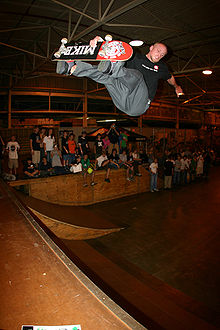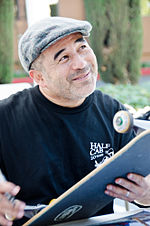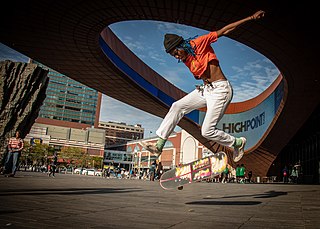
Skateboarding is an action sport originating in the United States that involves riding and performing tricks using a skateboard, as well as a recreational activity, an art form, an entertainment industry job, and a method of transportation. Skateboarding has been shaped and influenced by many skateboarders throughout the years. A 2009 report found that the skateboarding market is worth an estimated $4.8 billion in annual revenue, with 11.08 million active skateboarders in the world. In 2016, it was announced that skateboarding would be represented at the 2020 Summer Olympics in Tokyo, for both male and female teams.

Sponsoring something is the act of supporting an event, activity, person, or organization financially or through the provision of products or services. The individual or group that provides the support, similar to a benefactor, is known as the sponsor.

Chad Muska is an American professional skateboarder, musician and entrepreneur. In November 2012, Skin Phillips, editor-in-chief of Transworld Skateboarding, described Muska as "one of the most marketable pros skateboarding has ever seen."
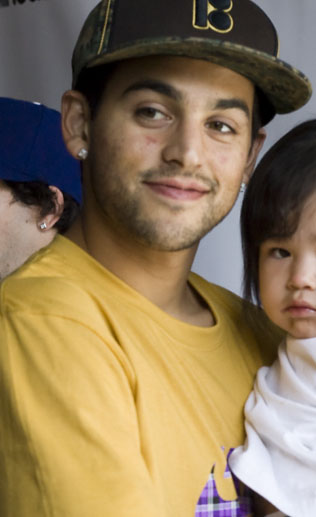
Paul Martin Rodriguez Jr., also known by his nickname P-Rod, is an American professional street skateboarder, actor, rapper, and recording artist. Rodriguez has won a total of eight medals at the X Games, four of them gold, with the most recent first-place victory occurring in Los Angeles, California in July 2012.

Blind is a skateboard company founded by Mark Gonzales in 1988 under Steve Rocco's World Industries distribution company. Gonzales has since left the company and today the company continues under the ownership of Dwindle Distribution. The company produces decks, wheels, soft goods and accessories. The company's logo for many years was a stylized grim reaper.

Almost Skateboards is an American skateboard company founded by professional skateboarders and business partners Rodney Mullen and Daewon Song. The company manufactures skateboard decks using 7-ply, 8-ply, and carbon fiber constructions, while the decks are bound with resin epoxy glue. As of November 2014, the brand is distributed by Dwindle Distribution.
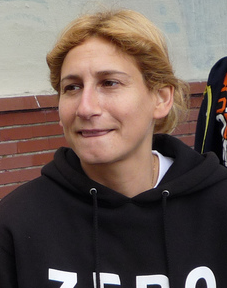
Elissa Steamer is an American professional skateboarder.

James Chris Cole is an American professional skateboarder. As of September 2020, his sponsors are Fallen Footwear, Monster Energy, Bones Bearings, Cult Crew, Thunder Trucks, Spitfire Wheels, Stance, Kershaw Knives, Grizzly Griptape, GoPro, Indian Motorcycles, cbdMD, Remind Insoles, and most recently Zero Skateboards.

Jerry Hsu is a Taiwanese-American skateboarder, photographer and owner/operator of the skate company "Sci-Fi Fantasy".
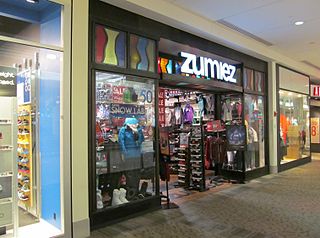
Zumiez Inc. is an American multinational specialty clothing store founded by Thomas Campion and Gary Haakenson in 1978, and publicly traded since 2005. The company is a specialty retailer of apparel, footwear, accessories and hardgoods for young men and women. Zumiez markets clothing for action sports, particularly skateboarding, snowboarding, and motocross. Zumiez is based in Lynnwood, Washington. The current president and CEO is Richard Brooks.
Stevie Williams is a professional skateboarder who was included in the twenty-seventh position of the "30 Most Influential Skaters of All Time" list that was compiled by Transworld Skateboarding in late 2011.
The International Association of Skateboard Companies (IASC) is a for-profit trade association that seeks to promote skateboarding as a leisure activity. Its board of directors includes representatives of a number of skateboarding companies who in turn represent a membership base of "skateboard manufacturers, distributors, contest organizers, ramp designers and individuals".
Steve Douglas is a retired professional skateboarder and longtime employee of the skateboard industry from London, United Kingdom (UK). Since April 2014, he has been the Vice President (VP) of Dwindle Distribution.

A fingerboard is a scaled-down replica of a skateboard that a person "rides" with their fingers, rather than their feet. A fingerboard is typically 100 millimeters (3.9 in) long with width ranging from 26 to 55 mm, with graphics, trucks and plastic or ball-bearing wheels, like a skateboard. A fingerboard can be used to do traditional skateboarding tricks, such as an ollie and kickflip.
Salman Agah is an American professional skateboarder and entrepreneur.

Sports marketing as a concept has established itself as a branch of marketing over the past few decades; however, a generally accepted definition does not exist. Academicians Kaser and Oelkers define sports marketing as 'using sports to market products'. It is a specific application of marketing principles and processes to sport products and to the marketing of non- sports products through association with sport.

Street skateboarding is a skateboarding discipline which focuses on flat-ground tricks, grinds, slides and aerials within urban environments, and public spaces. Street skateboarders meet, skate, and hang out in and around urban areas referred to as "spots," which are commonly streets, plazas or industrial areas. To add variety and complexity to street skateboarding, obstacles such as handrails, stairs, walls, flower beds, bins, park benches, picnic tables, and other street furniture may be traversed as single tricks or as part of a series of consecutive tricks called a "line."

DVS Shoes is an American footwear and clothing company that specialises in products for skateboarding, moto, and snowboarding. The company defines itself as "... driven from the pursuit of building product that embodies the sports the company athletes breathe every day. With roots deeply embedded in skate, the company has the platform to develop truly technological products that bring the riders personalities to life."

Cliché Skateboards was a skateboard company based in Lyon, France, and distributed by the American company Dwindle Distribution. The company was established in 1997 by French professional skateboarder Jeremie Daclin. In 2001, Cliché was purchased by the France-based Salomon Group which in 2005 became a part of Amer Sports. In 2009, US-based Dwindle Distribution purchased the company from the Salomon Group. In November 2016, Dwindle announced that they would be discontinuing the brand.
Reginald Barnes Jr, aka Reggie Barnes is a retired professional freestyle skateboarder and Founder/CEO of Eastern Skateboard Supply, the largest skateboard wholesale company in North America. Known as a "virtuoso" teen amateur, Barnes skated professionally from 1980 to 1991, with the Pepsi-Cola Pro Skateboard Team, Walker Skateboards, and Dogtown Skateboards. There were three Reggie Barnes' skateboards issued, two with Walker and one with Dogtown.
